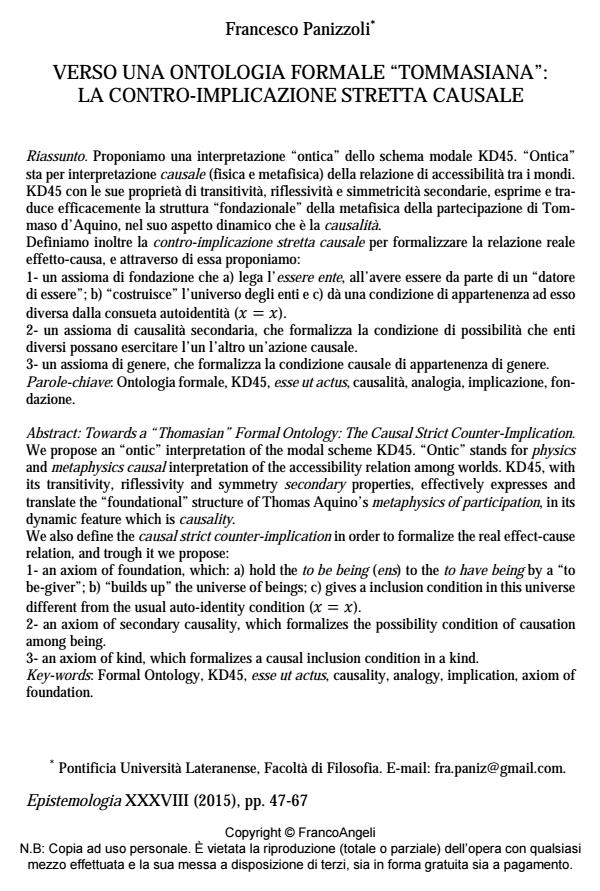Towards a "Thomasian" Formal Ontology: The Causal Strict Counter-Implication
Journal title EPISTEMOLOGIA
Author/s Francesco Panizzoli
Publishing Year 2015 Issue 2015/1
Language Italian Pages 21 P. 47-67 File size 141 KB
DOI 10.3280/EPIS2015-001004
DOI is like a bar code for intellectual property: to have more infomation
click here
Below, you can see the article first page
If you want to buy this article in PDF format, you can do it, following the instructions to buy download credits

FrancoAngeli is member of Publishers International Linking Association, Inc (PILA), a not-for-profit association which run the CrossRef service enabling links to and from online scholarly content.
We propose an "ontic" interpretation of the modal scheme KD45. "Ontic" stands for physics and metaphysics causal interpretation of the accessibility relation among worlds. KD45, with its transitivity, riflessivity and symmetry secondary properties, effectively expresses and translate the "foundational" structure of Thomas Aquino’s metaphysics of participation, in its dynamic feature which is causality. We also define the causal strict counter-implication in order to formalize the real effect-cause relation, and trough it we propose: 1- an axiom of foundation, which: a) hold the to be being (ens) to the to have being by a "to be-giver"; b) "builds up" the universe of beings; c) gives a inclusion condition in this universe different from the usual auto-identity condition . 2- an axiom of secondary causality, which formalizes the possibility condition of causation among being. 3- an axiom of kind, which formalizes a causal inclusion condition in a kind.
Keywords: Formal Ontology, KD45, esse ut actus, causality, analogy, implication, axiom of foundation.
- Basti G. (2002). Filosofia della natura e della scienza, vol. 1: I Fondamenti, Città del Vaticano, Lateran University Press.
- Basti G. (2004). Analogia, ontologia formale e problema dei fondamenti. In Basti G., Testi
- C.A. (eds.) (2004). Analogia e autoreferenza, Genova / Milano, Marietti 1820, pp. 159-
- 236. Basti G. (2007). Ontologia formale. Per una metafisica post-moderna. In Strumia A. (a cura di) (2007), Il problema dei fondamenti. Da Aristotele a Tommaso d’Aquino all’ontologia formale, Siena, Cantagalli, pp. 193-228.
- Kripke S.A. (1971). Identity and Necessity. In Munitz M.K. (ed.) (1971). Identity and Individuation, New York, New York University Press, pp. 135-164.
- Basti G. (2011a). Ontologia formale. Tommaso d’Aquino ed Edith Stein. In Ales Bello A., Alfieri F., Shahid M. (a cura di) (2011), Edith Stein – Hedwig Conrad-Martius – Gerda Walther. Fenomenologia della persona, della vita e della comunità, Bari, Laterza, pp. 81-358.
- Basti G. (2011b). Logica aletica, deontica e Ontologia formale: dalla verità ontica all’obbligo deontico. In Basti G., Gherri P. (2001), Logica e diritto: tra argomentazione e scoperta, Città del Vaticano, Lateran University Press, pp. 105-270.
- Basti G. (2014). L’ontologia formale del “realismo naturale”, cosmologia evolutiva e partecipazione dell’essere, Divus Thomas, 117(2), pp. 229-334.
- Basti G., Perrone A.L. (1996). Le radici forti del pensiero debole. Dalla metafisica, alla matematica, al calcolo, Padova, Il Poligrafo.
- Blackburn P., Van Benthem J., Wolter F. (eds.) (2007). Handbook in Modal Logic, Amsterdam, Elsevier.
- Blackburn P., De Rijke M., Venema Y. (2010). Modal logic. Cambridge tracts in theoretical computer science, Cambridge, Cambridge University Press.
- Bochenski J.M. (1995). Nove lezioni di logica simbolica, Bologna, Edizioni Studio Domenicano.
- Cellucci C. (2003). Le ragioni della logica, Roma / Bari, Laterza.
- Cocchiarella N.B. (2001). Logic and Ontology, Axiomathes,12, pp. 117-150.
- Cocchiarella N.B. (2007). Formal Ontology and Conceptual Realism, Dordrecht, Springer.
- D’Agostini F. (1997). Analitici e continentali, Milano, Raffaello Cortina Editore.
- D’Agostini F. (1999). Analitici, Continentali, Tomisti: la filosofia e il senso dell’essere, Divus Thomas, 24(3), pp. 53-78.
- Fabro C. (1939). La nozione metafisica di partecipazione secondo San Tommaso d’Aquino.
- In Fabro C. (2005), Opere Complete, Roma, Editrice del Verbo Incarnato, vol. 3.
- Fabro C. (1960). Partecipazione e causalità secondo San Tommaso d’Aquino. In Fabro C. (2010), Opere Complete, Roma, Editrice del Verbo Incarnato, vol. 19.
- Fabro C. (1936). La difesa critica del principio di causa. In Fabro C. (1969), Esegesi tomistica, Roma, Pontificia Università Lateranense, pp. 1-48.
- Galvan S. (1990). Logiche intensionali. Sistemi proposizionali di logica modale, deontica, epistemica, Milano, ISU.
- Girle R. (2009). Modal Logics and Philosophy, Durham, Acumen.
- Goldblatt R. (2006). Mathematical Modal Logic: A View of its Evolution. In Gabbay D.M.,
- Woods J. (eds.) (2006), Logic & the Modalities in the Twentieth Century, volume 7 of the Handbook of the History of Logic, Amsterdam, Elsevier, pp. 1-98.
- Hughes G.E., Cresswell M.J. (1996). A New Introduction to Modal Logic, London / New York, Routledge.
- Kripke S.A. (1959). Semantical Analysis of Modal Logic, Journal of Symbolic Logic, 24(4), pp. 323-324.
- Kripke S.A. (1959). A Completeness Theorem in Modal Logic, Journal of Symbolic Logic 24(1), pp.1-14.
- Kripke S.A. (1963a). Semantical Considerations on Modal Logic, Acta Philosophica Fennica, 16, pp. 83-94.
- Kripke S.A. (1963b). Semantical Analysis of Modal Logic I. Normal Propositional Calculi, Zeitschrift fur mathematischeLogik und Grundlagen der Mathematik, 9, pp. 67-96.
- Kripke S.A. (1963c). Semantical Analysis of Modal Logic II. Non-Normal Modal Propositional Calculi. In Addison J.W., Henkin L., Tarski A. (eds.) (1965), The Theory of Models (Proceedings of the 1963 International Symposium at Berkeley), Amsterdam, North Holland Publishing Co., pp. 206-220.
- Lewis C.I. (1918). A Survey of Symbolic Logic, Berkeley, University of California Press.
- Lewis C.I., Langford C.H. (1932). Symbolic Logic, New York, Dover.
- Rossi P. (1983). Clavis universalis. Arti della memoria e logica combinatoria da Lullo a Leibniz, Bologna, il Mulino.
- Tommaso d’Aquino, Opera Omnia. In Fundacion Tomàs de Aquino (ed.) (2013), http://www.corpusthomisticum.org.
- Wittgenstein L. (1921). Tractatus Logico-Philosophicus, London, Routledge & Kegan Paul Ltd. (trad it. Tractatus Logico-Philosophicus, Torino, Einaudi, 2009).
- Kripke S.A. (1980). Naming and Necessity, Oxford, Basil Blackwell.
Francesco Panizzoli, Verso una ontologia formale "tommasiana": la contro-implicazione stretta causale in "EPISTEMOLOGIA" 1/2015, pp 47-67, DOI: 10.3280/EPIS2015-001004